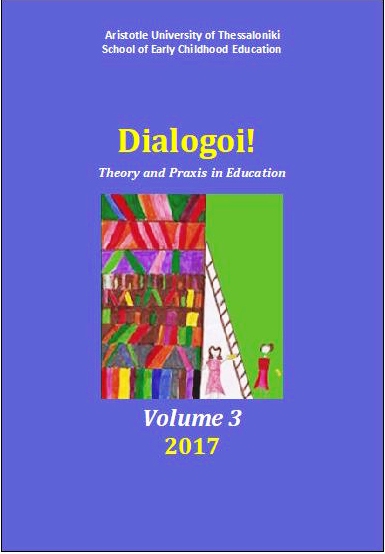Dialogic practices towards a participatory early childhood education: a teacher support model

Abstract
This research studies the processes and results of a collaborative action research that supported early childhood education (ECE) teachers to improve/change their dialogical practices during the learning process. The aim of the research was to explore the ECE teachers’ beliefs and practices regarding dialogue in the classroom as well to investigate the effectiveness of their support aiming to improve their dialogical practices during the learning process. Data from an one year collaborative action research with eight ECE teachers included individual interviews with teachers, group meetings, recorded dialogues in the classroom and individual interviews with and drawings from children. Results showed that despite the differences in ECE teachers’ beliefs about dialogue, their practices were similar highlighting the verbal dominance of the teacher in the classroom and the passive role attributed to children, thus limiting the opportunities for their participation in a democratic dialogue. However, ECE teachers’ beliefs and practices were altered after their support on a theoretical, research and reflective level. Results are discussed in the context of teachers’ professional learning and the improvement of teachers’ practice based on a repositioning of their beliefs and practices regarding dialogue processes and learning.
Article Details
- How to Cite
-
Likomitrou, S., & Avgitidou, S. (2017). Dialogic practices towards a participatory early childhood education: a teacher support model. Dialogoi! Theory and Praxis in Education, 3, 69–96. https://doi.org/10.12681/dial.14361
- Issue
- Vol. 3 (2017)
- Section
- Scientific columns

This work is licensed under a Creative Commons Attribution-NonCommercial-ShareAlike 4.0 International License.
Authors who publish with this journal agree to the following terms:
- Authors retain copyright and grant the journal right of first publication with the work simultaneously licensed under a Creative Commons Attribution Non-Commercial License that allows others to share the work with an acknowledgement of the work's authorship and initial publication in this journal.
- Authors are able to enter into separate, additional contractual arrangements for the non-exclusive distribution of the journal's published version of the work (e.g. post it to an institutional repository or publish it in a book), with an acknowledgement of its initial publication in this journal.
- Authors are permitted and encouraged to post their work online (preferably in institutional repositories or on their website) prior to and during the submission process, as it can lead to productive exchanges, as well as earlier and greater citation of published work (See The Effect of Open Access).



